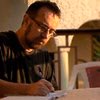Encounters with conflict and peace
About us
In 1996, just two years after the genocide, John Steward took a job with World Vision Rwanda as manager of healing, peace-building and reconciliation programs. In 2007, on one of his last visits to Rwanda, he invited Dave Fullerton and his video gear to join him. Dave fell in love with the place and RwandanStories is the result of that collaboration...

Dave draws pictures of buildings for a living, but he'll have a go at anything. For RwandanStories, he's the researcher, writer/editor, cameraman, film maker, graphic artist and web designer. He's an obsessive for quality media and over the past five years has learned a mind-blowing amount about Rwanda, its history and its hopes. He lives in Melbourne and has four grown-up children. One of them, Rachel, travelled to Rwanda with him to wield boom mics, play with the kids and be generally helpful.

John is a peace and reconciliation consultant. He has been to Rwanda seventeen times since the genocide of 1994. He led the development of World Vision Rwanda’s response to genocide trauma, and has given much of the past two decades of his life to helping people heal their memories and find a way to make peace with their past. Over the years, he has developed a passion for sharing stories of Rwanda. John now lives in Melbourne and has been an invaluable mentor throughout the development of this website.

Sally is a teacher who loves learning. While working with young people in Australian secondary schools over nine years, she has been involved with several innovative projects: city-based learning programs (Foundation for Young Australians) and media-focused curriculum which gets learners out into the ‘real world’. She is passionate about thinking and about values. Since she gave up her day job as a teacher this year, Sally has been writing the curriculum for Vanishing Point and runs the teacher professional development programs.
With the assistance of...

Back in Australia, the R.E.Ross Trust, The Portland House Foundation, Telematics Trust, Mission Enterprise, Melbourne Community Foundation, Morawetz Social Justice Fund, the Melbourne Anglican Cultural Organisation and many individual donors have together made this project possible.
LINKS
World Vision in Rwanda | World Vision Africa
About this website
RwandanStories is a close-up look at genocide and recovery in Rwanda.
In the few weeks I spent filming with Rwandans, their expressiveness, warmth and intelligence regularly blew me away as they described the moving reality of life after the unthinkable. They are amazing! As much as possible, I've tried to let Rwandans give their own insights into the roots of genocide and the struggle towards recovery.
I'm very aware this is just a tiny part of Rwanda's story. There are many important events, experiences, people and views which are not included here. We're hoping the website will continue to grow as a unique collection of video, photography and journalism which explores the origins, details and aftermath of the Rwandan genocide through the eyes of both victims and perpetrators.
In the few weeks I spent filming with Rwandans, their expressiveness, warmth and intelligence regularly blew me away as they described the moving reality of life after the unthinkable. They are amazing! As much as possible, I've tried to let Rwandans give their own insights into the roots of genocide and the struggle towards recovery.
I'm very aware this is just a tiny part of Rwanda's story. There are many important events, experiences, people and views which are not included here. We're hoping the website will continue to grow as a unique collection of video, photography and journalism which explores the origins, details and aftermath of the Rwandan genocide through the eyes of both victims and perpetrators.
About the curriculum resources
There are a wide range of downloadable curriculum resources available from VanishingPoint, based on RwandanStories. They include lesson plans, presentation slides and handouts, and are written for use in middle and senior secondary classrooms. Lessons are available individually, or in themed lesson packs and together they aim to build an in-depth understanding of our inclination towards prejudice, as individuals and as groups.
They also look at the possibilities for reconciliation, rebuilding and tolerance. In Rwanda, these are not abstract ideas. They're being experimented with every day by ordinary people who happen to be the survivors of genocide. As testing grounds go, that's about as close to the edge of human experience as you can get.
The curriculum resources include a wide range of classroom activities to help students think through the values, ideas and actions which can either create prejudice or build peace.
Latest update of this page Sunday 29th April 2012.
They also look at the possibilities for reconciliation, rebuilding and tolerance. In Rwanda, these are not abstract ideas. They're being experimented with every day by ordinary people who happen to be the survivors of genocide. As testing grounds go, that's about as close to the edge of human experience as you can get.
The curriculum resources include a wide range of classroom activities to help students think through the values, ideas and actions which can either create prejudice or build peace.
Latest update of this page Sunday 29th April 2012.
In this section

